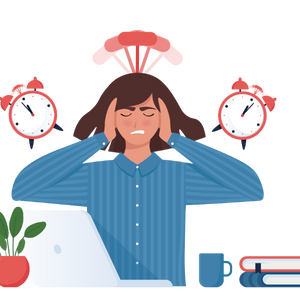Lifestyle factors play a significant role in a woman’s ability to conceive and carry a pregnancy to term. Some of the major lifestyle factors that can affect fertility in women include:
 Poor Diet
Poor Diet
A poor diet can negatively impact a woman’s fertility by:
- Weight issues: A diet that is high in calories, sugar, and processed foods can cause weight gain, which in turn can lead to infertility. Being overweight or underweight can disrupt the menstrual cycle, making it difficult to conceive.
- Hormonal imbalances: A diet high in processed foods, refined sugars, and unhealthy fats can disrupt the delicate balance of hormones in the body. This can result in infertility and other reproductive issues.
- Chronic inflammation: A diet high in processed foods, unhealthy fats, and refined sugars can lead to chronic inflammation in the body. This can cause damage to the reproductive system and make it difficult for women to conceive.
- Ovarian function: A diet that is low in antioxidants and nutrients can lead to decreased ovarian function, reducing the chances of ovulation and making it more difficult to conceive.
 Lack of exercise
Lack of exercise
Lack of exercise can affect a woman’s fertility in several ways:
- Weight: Inactivity can lead to weight gain, which can disrupt ovulation and negatively impact fertility.
- Hormonal balance: Exercise helps regulate hormones such as insulin, estrogen, and testosterone, which are important for ovulation and fertility. Lack of exercise can disrupt the hormonal balance, leading to infertility.
- Stress: Exercise can help reduce stress and improve overall mental health, which is important for maintaining a healthy menstrual cycle and fertility. Lack of exercise can increase stress levels, which can affect the hormones responsible for regulating ovulation and the menstrual cycle.
 Alcohol
Alcohol
Alcohol can negatively impact a woman’s fertility by affecting ovulation and damaging eggs. Here’s how:
- Ovulation: Alcohol consumption can disrupt the hormones responsible for regulating ovulation, leading to irregular menstrual cycles and making it more difficult to conceive.
- Egg quality: Alcohol can cause oxidative stress and damage to the DNA of the eggs, reducing their quality and increasing the risk of miscarriage or birth defects.
- Hormone levels: Alcohol can also affect hormone levels, such as inhibiting the production of estrogen and progesterone, which are necessary for maintaining a healthy menstrual cycle and pregnancy.
- Liver function: Alcohol consumption can also impact liver function, which is important for processing hormones and eliminating toxins from the body.
 Stress
Stress
Stress can affect a woman’s fertility by disrupting the hormones that regulate the menstrual cycle and ovulation. Here’s how:
- Hormones: Stress can increase the levels of cortisol, the hormone responsible for stress response, and decrease the levels of gonadotropin-releasing hormone (GnRH), which triggers the release of follicle-stimulating hormone (FSH) and luteinizing hormone (LH). This hormonal imbalance can lead to irregular menstrual cycles and ovulation, making it more difficult to conceive.
- Ovulation: Stress can also affect the timing and quality of ovulation, leading to poor egg quality and a reduced chance of pregnancy.\
 Sleep patterns
Sleep patterns
Sleep patterns can affect fertility in women through the impact they have on the hormonal balance of the body. Disruptions to a woman’s normal sleep patterns, such as those caused by shift work or sleep disorders, can affect the secretion of hormones, such as melatonin and cortisol, that regulate the menstrual cycle and ovulation. This can lead to changes in the menstrual cycle, irregular ovulation, and decreased fertility. Additionally, poor sleep quality and quantity have been linked to higher levels of stress and anxiety, which can also impact fertility. Maintaining regular and consistent sleep patterns, along with adequate sleep duration, is important for optimal reproductive health in women.
